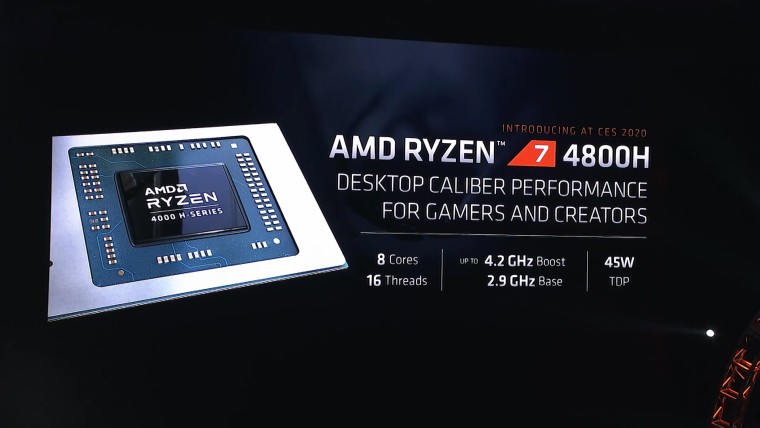
AMD unveiled its Ryzen 4000 series processors aimed at laptops earlier this year. These processors were the first-ever x86 chips built on a 7nm process. The 4000 series come in U series (15W) and H series (45W) flavors and compete against Intel’s 10th-gen Ice Lake series of chips built on the 10nm process. While AMD compared the Ryzen 4800U chip with Intel’s Core i7-1065G7, the H series chipsets, said to launch in the first half of 2020, were touted to provide “desktop-level performance”. The company even went on to say that the Ryzen 4800H offers better performance than the 95W Intel Core i7-9700K processor.
Now, 3Dmark benchmark results of the Ryzen 4800H processor against Intel’s upcoming Comet Lake H-series equivalent chip based on a 14nm process, the i7-10750H, have leaked. Intel’s Comet Lake versions of the H-series are due sometime this year. Interestingly, as per the source, the Ryzen 4800H was paired with a Radeon RX 5600M mobile GPU, whereas the Intel Core i7-10750H was paired with the Nvidia GeForce RTX 2060 Max-Q mobile GPU.
Fire Strike
— _rogame (@_rogame) February 6, 2020
R7 4800H + RX 5600M
vs
i7-10750H + New 2060 Max Q pic.twitter.com/Kl8oFcQAlf
While the CPU comparison is not exactly a head-to-head comparison owing to the difference in cores and threads between the two processors, with the AMD chip containing two more cores and four more threads, and the Intel chip gaining ground in terms of higher boost frequencies, the tendency of 3DMark to favor higher clock speeds over core counts balances out the difference.
The AMD chips seem to have an upper hand in 3DMark’s Fire Strike test results. Team red’s chips dominate the tests against that of Intel’s processor and Nvidia GPU. Since AMD’s chip also comes with an integrated Vega GPU, the processor outperforms Intel’s offering in graphics and physics benchmarks that test the GPU and CPU separately. However, when combined with the dedicated GPUs, the Core i7-10750H paired with the Nvidia card gains an upper hand. This could possibly be blamed at the lack of optimization in pre-production chips.
It will be interesting to see how AMD and Intel place these mobile-gaming focused offerings, and if AMD's gains seen in these benchmarks here indeed improve when the offerings reach production.
Source: _rogame (Twitter) via NotebookCheck
















10 Comments - Add comment